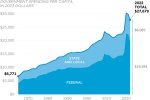Every time we have a “government shutdown,” they actually only shut down those services deemed “non-essential.”
So why are we going into debt to spend a fortune on non-essentials?
There’s your starting point.
You pose an interesting question. The following is a list of "non-exsential" services most affected by the last shutdown, and though not all services came to a complete halt, they were severely curtailed with only 30% of workforce. Which do you thing we could do away with on a permanent basis?
• Social Security and Medicare: Checks are sent out, but benefit verification as well as card issuance ceased.
• Environmental and Food Inspection. EPA) inspections that include hazardous waste, drinking water, and chemical facilities, and the Food and Drug Administration (FDA) inspections.
• National Parks: kept open but no services or trash collection
• Air Travel: air traffic controllers and Transportation Security Administration (TSA) agents work, but without janitorial and clerical support.
• Health and Human Services:. (NIH) would be prevented from admitting new patients or processing grant applications. States would be forced to front the money for formula grant programs such as Temporary Assistance for Needy Families (TANF, sometimes described as “cash welfare”).
• Internal Revenue Service (IRS): As a result of funds provided in the Inflation Reduction Act, essential IRS operations would continue, and roughly one-third of its nearly 90,000 employees would be exempt from furlough, but without janitorial or clerical support.
• Supplemental Nutrition Assistance Program (SNAP):Though funding for the SNAP program is mandatory, the ability to send out “food stamp” benefits could be affected since continuing resolutions have generally only authorized the Agriculture Department (USDA) to send out benefits for 30 days after a shutdown.
So these are the programs that would be, and no doubt are, the targets.





